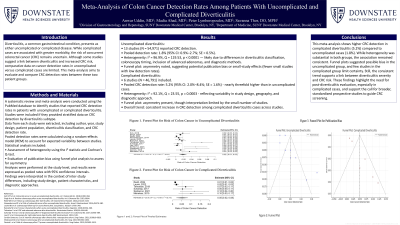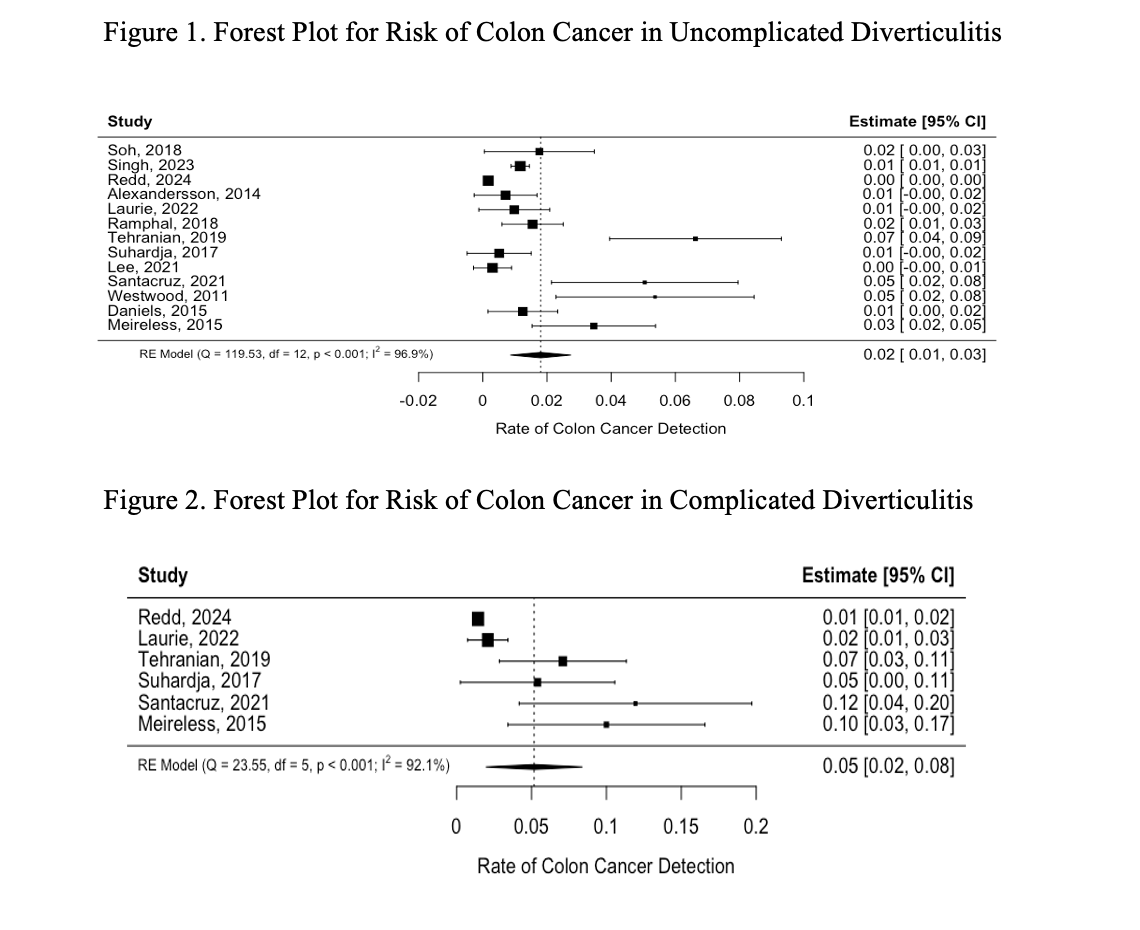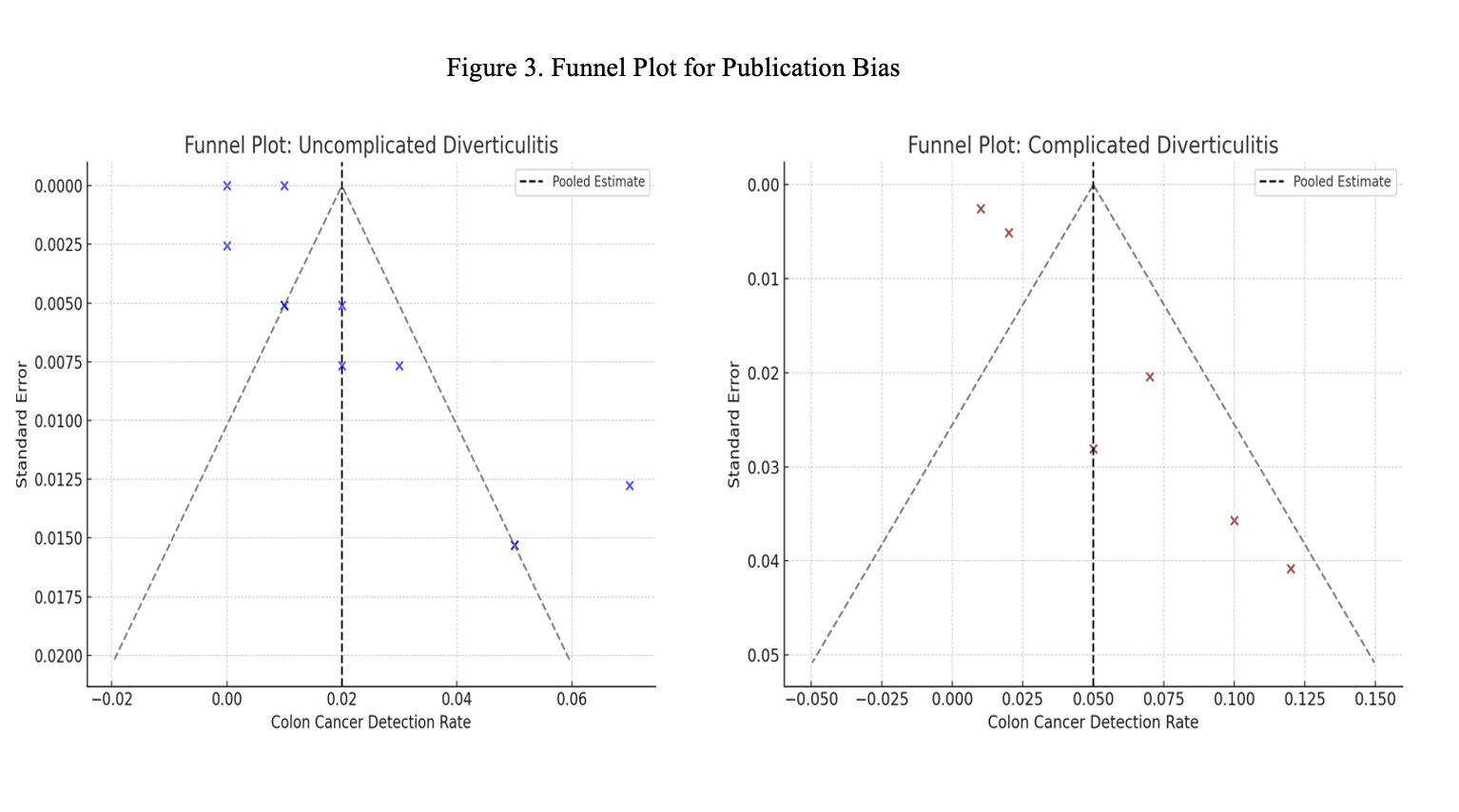Monday Poster Session
Category: Colon
P2445 - Meta-Analysis of Colon Cancer Detection Rates Among Patients With Uncomplicated and Complicated Diverticulitis


Anwar Uddin, MD
SUNY Downstate Health Sciences University
Brooklyn, NY
Presenting Author(s)
Anwar Uddin, MD, Madia Ahad, MD, Peter Lymberopoulos, MD, Savanna Thor, DO, MPH
SUNY Downstate Health Sciences University, Brooklyn, NY
Introduction:
Diverticulitis, a common gastrointestinal condition, presents as either uncomplicated or complicated disease. While complicated cases are associated with greater morbidity, the risk of concurrent colorectal cancer (CRC) remains uncertain. Although some studies suggest a link between diverticulitis and increased CRC risk, comparative data on cancer detection rates in uncomplicated versus complicated cases are limited. This meta-analysis aims to evaluate and compare CRC detection rates between these two patient groups.
Methods: A systematic review and meta-analysis were performed using PubMed to identify studies reporting CRC detection rates in uncomplicated and complicated diverticulitis. Included studies provided stratified detection data. Pooled rates were estimated using a random-effects model (REM). Heterogeneity was assessed using I² and Q-test, and funnel plots evaluated potential publication bias.
Results:
Thirteen studies (N = 54,971) reported CRC detection in uncomplicated diverticulitis, with a pooled rate of 1.8% (95% CI: 0.9%–2.7%; SE = 0.5%). Heterogeneity was high (I² = 96.9%; Q = 119.53, p < 0.0001), likely due to differences in diverticulitis classification, colonoscopy timing, inclusion of advanced adenomas, and diagnostic methods. Funnel plot asymmetry suggests possible publication bias or small-study effects, with fewer small studies showing low detection rates. In complicated diverticulitis, six studies (N = 46,791) showed a pooled detection rate of 5.2% (95% CI: 2.0%–8.4%; SE = 1.6%), nearly threefold higher. Heterogeneity was also high (I² = 92.1%; Q = 23.55, p = 0.0003), likely reflecting differences in study design, geography, and detection methods. Funnel plot asymmetry was present, though interpretation is limited by the small number of studies. Still, the trend toward increased CRC detection in complicated cases remained consistent.
Discussion: This meta-analysis shows higher CRC detection in complicated diverticulitis (5.2%) compared to uncomplicated cases (1.8%). While heterogeneity was substantial in both groups, the association remained consistent. Funnel plots suggested possible bias in the uncomplicated group, and few studies in the complicated group limit certainty. Still, the consistent trend supports a link between diverticulitis severity and CRC risk. These findings highlight the need for post-diverticulitis evaluation, especially in complicated cases, and support the call for broader, standardized prospective studies to guide CRC screening.


Disclosures:
Anwar Uddin, MD, Madia Ahad, MD, Peter Lymberopoulos, MD, Savanna Thor, DO, MPH. P2445 - Meta-Analysis of Colon Cancer Detection Rates Among Patients With Uncomplicated and Complicated Diverticulitis, ACG 2025 Annual Scientific Meeting Abstracts. Phoenix, AZ: American College of Gastroenterology.

